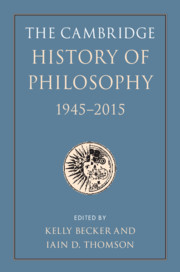Book contents
- The Cambridge History of Philosophy, 1945–2015
- The Cambridge History of Philosophy, 1945–2015
- Copyright page
- Contents
- Contributors
- Preface and Acknowledgments
- Introduction
- Part I Analytic Philosophy
- Part II Continental Philosophy
- Part III Bridge Builders, Border Crossers, Synthesizers, and Comparative Philosophy
- Section Eight Bridge Builders, Border Crossers, Synthesizers
- 42 Rethinking the Analytic/Continental Divide
- 43 Phenomenology and Ordinary Language Philosophy
- 44 Phenomenology Meets Philosophy of Mind and Language
- 45 The Impact of Pragmatism
- 46 Unruly Readers, Unruly Words
- 47 Anglo-American Existential Phenomenology
- 48 A Conceptual Genealogy of the Pittsburgh School
- Section Nine Comparative Philosophy
- Part IV Epilogue: On the Philosophy of the History of Philosophy
- References
- Index
46 - Unruly Readers, Unruly Words
Wittgenstein and Language
from Section Eight - Bridge Builders, Border Crossers, Synthesizers
Published online by Cambridge University Press: 08 November 2019
- The Cambridge History of Philosophy, 1945–2015
- The Cambridge History of Philosophy, 1945–2015
- Copyright page
- Contents
- Contributors
- Preface and Acknowledgments
- Introduction
- Part I Analytic Philosophy
- Part II Continental Philosophy
- Part III Bridge Builders, Border Crossers, Synthesizers, and Comparative Philosophy
- Section Eight Bridge Builders, Border Crossers, Synthesizers
- 42 Rethinking the Analytic/Continental Divide
- 43 Phenomenology and Ordinary Language Philosophy
- 44 Phenomenology Meets Philosophy of Mind and Language
- 45 The Impact of Pragmatism
- 46 Unruly Readers, Unruly Words
- 47 Anglo-American Existential Phenomenology
- 48 A Conceptual Genealogy of the Pittsburgh School
- Section Nine Comparative Philosophy
- Part IV Epilogue: On the Philosophy of the History of Philosophy
- References
- Index
Summary
At §194 of the Philosophical Investigations, Wittgenstein writes the following about what tends to happen in philosophy: “When we do philosophy, we are like savages, primitive people, who hear the way in which civilized people talk, put a false interpretation on it, and then draw the oddest conclusions from this.”1 With just a bit of tweaking, Wittgenstein’s remark might be taken to be applicable to readers of his work: When we read Wittgenstein, we are like savages, primitive people, and so forth. At least, that is how some readers of his work must appear to other readers, given how polarized readings of his philosophy can be. Although Wittgenstein’s life extended only six years into the period of philosophy covered by this volume (as he died in 1951), his shadow – much like that of Nietzsche’s Buddha in The Gay Science – nonetheless looms over its entirety. One measure of this is the vast scholarship devoted to Wittgenstein’s work in the form of articles, anthologies, and monographs, which has grown so large as to be practically unsurveyable.2
- Type
- Chapter
- Information
- The Cambridge History of Philosophy, 1945–2015 , pp. 634 - 645Publisher: Cambridge University PressPrint publication year: 2019



